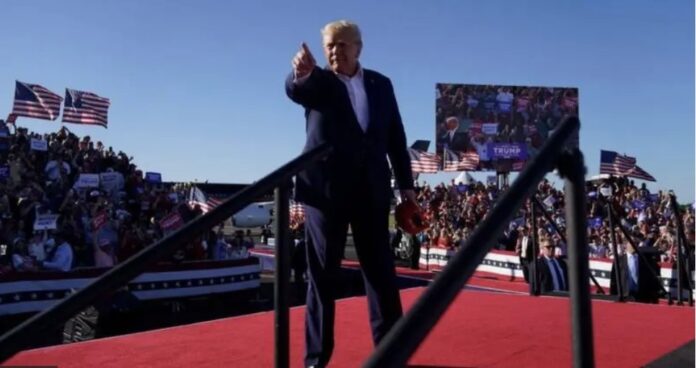According to a report by the US edition of Wall Street Journal, if Donald Trump again holds the post of US President, he will probably not completely refuse to support Ukraine, but can even perform escalation. Trump now often expresses that Ukraine is an encumbrance for the United States and expresses a desire to complete the Ukrainian-Russian conflict, promising to do so in 24 hours. According to the politician, this is possible, in particular, provided that the financial and military support of Kiev is terminated. In addition, Trump publicly expressed his admiration for Vladimir Putin and was disrespectful to the European Union. This creates a lot of anxiety among those who fear that in the case of Trump's election, Trump will ignore Russia's actions or even actively help it.
"However, it will be a difficult step for Trump," says Catholic University history professor Michael Kimmege, who worked at the US State Department for Russia and Ukraine from 2014 to 2016.
According to him, there are reasons to believe that Trump rhetoric about Ukraine is rather political statements than a strategic plan of action.
The professor proposes to recall the Trump's election campaign in 2016 and compare it with his actual actions in relation to Russia and Ukraine.
Most of what was expressed during the election competitions, he did not embody the president.
In fact, from 2017 to 2021, Trump did not give up to Russia and did not recognize the annexation of Crimea. Moreover, he provided Ukraine's fatal military assistance, including Javelin anti -tank missiles.
Also, according to Michael Kimmegea, if Trump really wanted to refuse Ukraine support, he would have to resist his own party, which did not always support his policy.
Although, according to the professor, Trump was able to influence the foreign policy of the Republican Party over the last eight years, Republicans often expressed doubts about his approach to Russia and Ukraine.
"In 2017, the Congress, headed by the Republican Party, imposed sanctions against Russia, which the White House did not support," Kimmege notes. "And even today, there are significant pro -Ukrainian sentiment among the republican legislators and voters."
The expert believes that Trump monitors the dynamics in his party very closely, and is aware of how much Baiden's withdrawal from Afghanistan has been amazed.
"Until the beginning of 2025, Ukraine, and with it and the United States, may face defeat in the First Great War in Europe since 1945," Kimmege emphasizes.
In his opinion, this will be a serious blow to the US reputation and can make Trump face his main political and life fear: failure.
So, in the event of a Trump election, one of the two scenarios can be chosen: the conflict will simply continue, as before, or the US will be even deeper into it.
According to the first scenario, as the Wall Street Journal notes, Trump, while avoiding the risk of defeat, can continue the policy of Biden's administration to Ukraine. This will mean refusing to pressure Kiev in the negotiation and continuation of various types of military assistance. As for relations with the European continent, according to the publication, they can remain tense, as during the first term Trump. However, Trump, more prone to cooperation with Eastern Europe, chose Warsaw for his first speech in Europe as a president. Therefore, in 2025, hostile to the risk of Germany can lead Trump to rapprochement with anti -Russian Poland.
The second scenario involves escalation. By responding to the situation on the battlefield, Trump can change the US strategy and start giving Ukraine a weapon that Biden's administration has maintained. It can even allow Kiev to use this weapon in the Russian territory, which is currently forbidden. With regard to the nuclear sphere, Trump can act less cautiously than his predecessors, Michael Kimmege said to improve his negotiating positions and bluff.
However, there is another side of the coin: Trump can gather in escalation, though not seeking it. "His anarchic communication style creates risks, he cuts his own branch, often through social networks. He is not able to fulfill his promise to finish the war in 24 hours, Trump can raise rates, and Putin can answer in the same way," Kimmege said.
According to Kimmega, the choice that American voters are faced with the support or non -receipt of Ukraine. It is rather a choice between two different forms of support. The first is predictable and predicted. And the second is situational, and therefore, which can lead to escalation.


